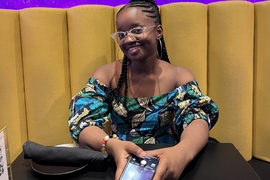The following is part of a series of short interviews from the Department of Electrical Engineering and Computer Science (EECS) featuring a student describing themselves and life at MIT. Today’s interviewee, Titus Roesler, is a senior majoring in electrical science and engineering. As a first-year at MIT, Roesler joined the Experimental Study Group (ESG), a learning community that offers new MIT students the general Institute requirements (GIRs) in a small, tight-knit class setting. Roesler stuck around as an associate advisor in subsequent years for new cohorts of first-year ESG students, as a teaching assistant for classes on calculus and group theory, and as an instructor for special seminars in electrical engineering that he designed from scratch and then taught. Roesler’s commitment to his academic community also goes deep. Besides his teaching work, for which he was recently honored with the EECS Undergraduate Teaching Award, he is a member of the Undergraduate Student Advisory Group in EECS (USAGE), which provides student feedback to the department.
Q: Tell us about one teacher from your past who had an influence on the person you’ve become.
A: While a student in ESG, I took ES.1801 (Single-Variable Calculus), ES.1802 (Multivariable Calculus), and ES.1803 (Differential Equations), all with Gabrielle Stoy. One morning in late spring, Gabrielle asked me to stick around after class to speak with her. (I wondered which course policy I had violated, and worried throughout the lecture.) Instead, Gabrielle asked me if I would apply to be a teaching assistant for an ESG math class the next semester. I was ecstatic — and thus began my “teaching career” at MIT! Gabrielle formally retired from teaching mathematics in ESG in 2024, but we teamed up again to offer a special seminar on group theory over IAP [Independent Activities Period] 2025.
Q: What is one conversation that changed the trajectory of your life?
A: I’m grateful for all the conversations I’ve had with Prof. Denny Freeman. I appreciate his kindness, wisdom, and willingness to find time to discuss career plans, research, and education with me. I’ve always left his office feeling more ambitious and optimistic than I did when I walked in.
Q: Do you have a bucket list? If so, share one or two of the items on it.
A: Running the Boston Marathon was on my bucket list for a few years, and I checked that off in 2024. Beyond that, I would love to explore Antarctica — perhaps by living and working at a research station for a year.
Q: What’s your favorite key on a standard computer keyboard, and why?
A: The backslash ( \ ) key is my favorite. I use it often for TEX commands when typesetting.
Q: If you suddenly won the lottery, what would you spend some of the money on?
A: A bulk order of Hagoromo chalk — the so-called “Rolls-Royce of chalk!”
Q: If you had to teach a really in-depth class about a niche topic, what would you pick?
A: In the context of signal processing, filters sift out desired frequency bands while attenuating others. I’d be interested in teaching a class on the theory and practice behind filter design — constructing a filter that satisfies a set of specifications. For example, analog or digital? Finite impulse response or infinite impulse response? Group delay? Causality? Stability? Practical implementation? I’m not an expert in filter design myself, but I’d appreciate the opportunity to consolidate what I’ve learned so far and study the topic in greater depth.







